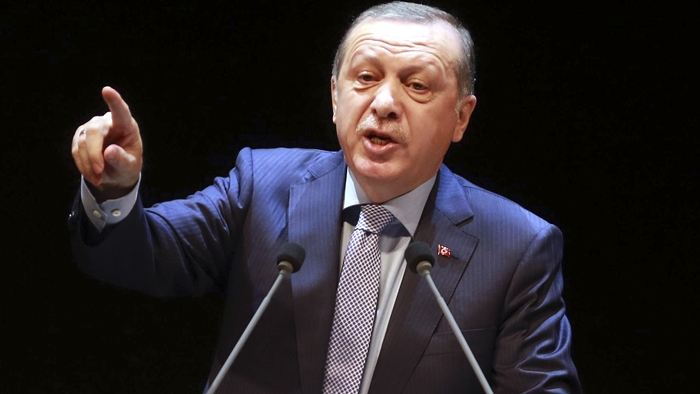Turkey’s President Recep Tayyip Erdoğan on Thursday lashed out at German Chancellor Angela Merkel, who criticized Turkey for its actions against freedom of the press, accusing her country of harboring terrorists.
“They are giving us advice. But it is we who are concerned about your stance. You are aiding terrorism. That terror will hit us like a boomerang. We have no expectations from you, but you will go down in history for harboring terrorists,” Erdoğan said in a speech in the Turkish capital of Ankara.
In a speech on Wednesday, German Chancellor Angela Merkel criticized an ongoing government crackdown on press organizations in Turkey over the detention of at least 12 journalists from the opposition Cumhuriyet daily on Monday.
“It is highly alarming that … freedom of the press and opinion is again and again being restricted,” Merkel said in Berlin. “The latest example of this already very sad development is what happened with the editors and editor-in-chief at the Cumhuriyet newspaper, and we have very great doubts that this corresponds with the principles of a state of law.”
Erdoğan said Germany, which has opened its arms to members of other terrorist organizations in Turkey, is now doing the same for the followers of the Gülen movement.
“We are concerned that Germany, which has been taking members of terrorist organizations such as the [outlawed Kurdistan Workers’ Party] PKK and the [Revolutionary People’s Liberation Party/Front] DHKP/C under its protection, will now become a backyard of [the Fethullahist Terror Organization] FETÖ,” he added.
“FETÖ” is a derogatory term coined by President Erdoğan and the Justice and Development Party (AKP) government to refer to the Gülen movement, which Erdoğan and the AKP accuse of masterminding a failed coup attempt on July 15. The movement strongly denies having any role in the coup attempt.
“Terror is like a scorpion. Eventually it will bite the one who is carrying it. I don’t see a bright future for Germany. It has become a place where terrorists take refuge. There are racist attacks against Turks in Germany. It is unacceptable that Germany protects terrorists,” Erdoğan said.
Merkel said Germany will pay close attention to the investigation of the journalists. She noted that Germany’s ambassador to Turkey visited Cumhuriyet’s offices on Tuesday “to underline again how important the issue of freedom of opinion and press freedom is to us.”
“Of course, such an issue also plays a central role in questions regarding membership talks with the European Union,” she added.
“If Germany doubts whether FETÖ is a terrorist group, I invite them to come and visit the Turkish Parliament and Special Forces buildings, which were bombed on July 15,” Erdoğan added, referring to the night of the failed military coup attempt.
Erdoğan’s remarks also came in response to German Justice Minister Heiko Maas who announced on Tuesday that the German government would not carry out extraditions within the context of politically motivated investigations in Turkey.
“In terms of serious crimes, premeditated murders and similar other crimes committed in Turkey, then we will discuss the issue in the event of an extradition demand. However, if the judicial procedure is based on political motivations, there can be no discussion of extradition whatsoever,” Maas said.
The failed military coup attempt on July 15 killed over 240 people and wounded more than a thousand others. Immediately after the putsch, the government along with President Erdoğan pinned the blame on the Gülen movement.
Despite Turkish Islamic scholar Fethullah Gülen, whose views inspired the movement, and the movement having denied the accusation, Erdoğan — calling the coup attempt “a gift from God” — and the government launched a widespread purge aimed at cleansing sympathizers of the movement from within state institutions, dehumanizing its popular figures and putting them in custody.
About 120,000 people have been purged from state bodies, in excess of 80,000 detained and more than 36,000 have been arrested since the coup attempt. Arrestees include journalists, judges, prosecutors, police and military officers, academics, governors and even a comedian. Critics argue that lists of Gülen sympathizers were drawn up prior to the coup attempt.
